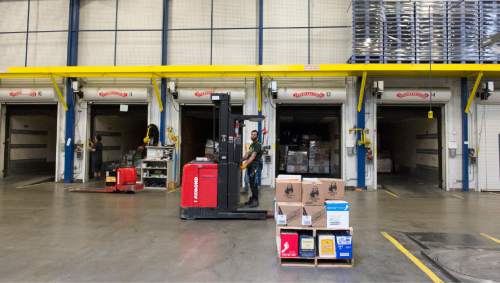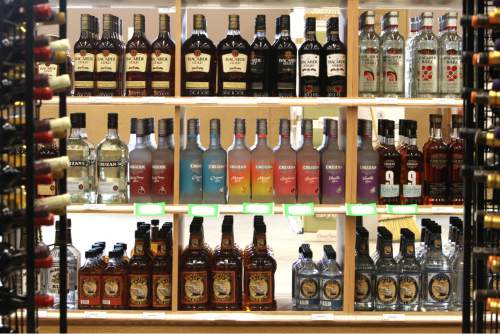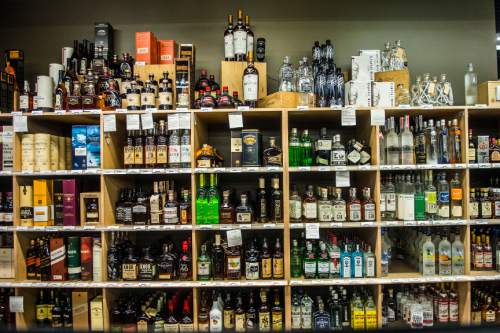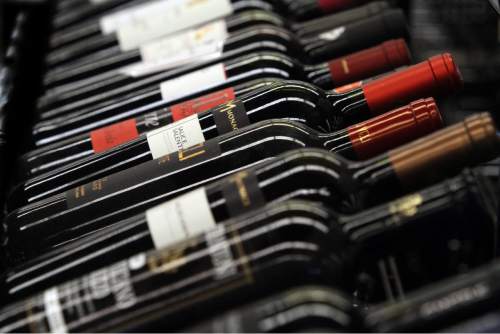This is an archived article that was published on sltrib.com in 2016, and information in the article may be outdated. It is provided only for personal research purposes and may not be reprinted.
The Utah Department of Alcoholic Beverage Control will have more money to spend when the new fiscal year starts July 1, allowing the state agency to — among other things — give employees a 2 percent pay raise, hire more liquor store workers and bring on a full-time public information officer.
The 2 percent raise for the state's 500 liquor store employees and 60 administrative staff and warehouse workers is in addition to the 2 percent boost that the Legislature gave all state employees, said Cade Meier, DABC'S deputy director.
On Tuesday, DABC Director Sal Petilos sent an internal memo announcing the additional pay raises.
Meier said the DABC will have a $46.6 million operating budget for 2016-17. That's an increase of nearly $3 million over last year, when the Legislature slashed the department's operating budget by $500,000. To make ends meet, the department left vacant positions at liquor stores unfilled, had managers oversee more than one store and offered early retirement bonuses to qualified employees. The cuts — coupled with years of meager wages — sparked criticism and affected already low employee morale.
"Hooray! It's decades overdue," Sen. Karen Mayne, D-West Valley City, said about the pay increases. "They need it."
Mayne, who has become an advocate for DABC employees, said she believes pay raises are just the first step to improving the state's retail liquor operations. "We still need legislation that gives financial stability to the DABC, rather than being funded on whichever way the winds are blowing in the Legislature."
The Legislature was more generous in 2016, restoring the $500,000 that was cut; the overall budget also includes several new pieces of legislation that earmark funding for specific uses, including:
• $557,000 to hire staff for a new store to be built in West Valley City later this year
• $500,000 to hire 11 full-time (or equivalent) employees for busy stores around the state
• $783,000 to cover the bank fees charged when customers use credit and debit cards
• $230,000 to increase compensation for some of the state's 170 package-agency owners
• $41,000 for a new forklift for the DABC warehouse
• Permission to bond for a yet-to-be-determined amount and buy land for a new store in Syracuse
Meier said one of the first orders of DABC business when the new budget year begins will be to hire a full-time public information officer to deal with the growing number of media inquiries to the department. The job pays an annual salary between $56,000 and $84,000, plus retirement and health benefits. The position is being advertised at statejobs.utah.gov/jobseeker.
Administrative assistant Vickie Ashby currently serves as the DABC spokeswoman, but she has other duties and hiring a new media expert "gives her the opportunity to do other projects that we need her to do," Meier said.
DABC critics are disappointed about the new media position. "It looks like the governor and his inside circle know there is a great weakness at the DABC, but instead of doing anything about it, they want a PR person to cover it," said Kerri Adams. "Definitely putting lipstick on a pig."
Adams pointed to a monthslong review by the Governor's Office of Management and Budget, which recommended that the DABC improve its operations by offering employee pay raises and increasing staff hours to meet the state's growing thirst for wine, beer and spirits.
"The stores continue to have reduced man hours," she said.
The minimal staffing comes at a time when the DABC budget continues to grow. For this fiscal year's first 10 months (July 2015-April 2016), the DABC's retail alcohol sales were up more than 7 percent, or nearly $25 million, over last year, according to the department's monthly financial reports. Since 2002, liquor sales have increased 153 percent, from $156.2 million to $396 million.











